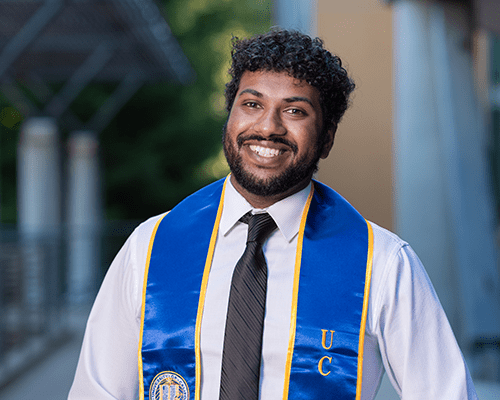Degree Program: B.S, Computer Science, minor in Applied Mathematics
Graduate Institution: Chapman University
Undergraduate Institution: UC Santa Cruz
Department: Computer Science and Engineering
LinkedIn: linkedin.com/in/keerthi-krishnan-756b75135/

“Baskin [Engineering] gave me that forefront of knowledge that allowed me to excel in my graduate career.”
Keerthi Krishnan graduated from the Baskin School of Engineering in spring 2020 with a B.S. in computer science and a minor in applied mathematics. During his time at UC Santa Cruz, he was involved in interdisciplinary research projects and student organizations, where he often took part in leadership roles. Krishnan is now pursuing a master’s degree in computational data sciences at Chapman University with plans to continue on to a doctoral degree program and eventually teach at the university level.
Why did you choose the Baskin School of Engineering for your undergraduate degree?
UC Santa Cruz was one of the only schools I was looking at that offered both the computer science and applied mathematics undergraduate degree programs in the School of Engineering. I really wanted to receive a computer science degree with a minor in mathematics within the same school, so it worked out great. Plus, when I looked over the curriculum charts, I saw that both programs were comprehensive and covered a lot of areas that I had interest in.
What research did you focus on during your undergrad?
The research I mainly focused on was taking computer science as an application into biological systems. The first research I undertook was with the Genomics Institute. It was my first interaction with using CS applications and mathematical modeling applications into modeling biological systems and biological processes. I then got an internship with the National Oceanic Atmospheric Administration (NOAA) in Santa Cruz. There, I did a lot of mathematical modeling for bacterial ecosystems. It was very interesting.
I took a couple machine learning courses and an artificial intelligence course during my senior year. Those classes piqued my interest in those fields, and I was interested in finding ways to incorporate those methods into the biological systems research I was already doing. I have a lot to thank the Baskin School of Engineering for because Baskin gave me that forefront of knowledge that allowed me to excel in my graduate career.
Tell me about the organizations you were involved in at UCSC and how they helped shape your personal and professional growth.
During my freshman year, I joined a lot of different engineering-related organizations that gave me an introduction to engineering and the different areas of study within engineering. I also joined the Taza Tal A Cappella group my freshman year and stayed with that until I graduated. I was captain in both my junior and senior years. That experience really shaped my leadership abilities. There was a lot to organize and manage as a captain of a 16-18 person team. I was also part of the UCSC Hindu Student Association for all four years of my undergrad. In that organization, I was able to interact with a lot of campus organizations that welcomed discussion and built a sense of community. I also met a lot of people within Baskin Engineering who helped me navigate my way through my degree program, highlighting resources and providing advice on which courses to take.
What are a couple favorite memories you have while at UC Santa Cruz?
My favorite memory that relates to my time at Baskin Engineering is going to the Science and Engineering Library with friends to study. We would spend hours in the library, which really created a bond with one other and allowed us to bounce ideas off each other and better prepare for our exams.
Another favorite memory is going to a cappella practice. Going to those regularly scheduled practices was a major stress reliever. It was nice to interact with my friends and release any pent-up stress.
Tell me about your master’s program at Chapman University and the research you’re working on currently.
I’m doing my master’s in computational data sciences and my concentration is in bioinformatics and pharmacokinetics. My research entails using machine learning applications to aid in drug discovery of different disease proteins. We’re mainly working with cancer proteins, where we use machine learning to generate kinase inhibitors as potential drug candidates. And now, part of our work has shifted to a focus on COVID proteins in light of the pandemic. Through UCSC, I really got an idea of what interdisciplinary research entailed and was exposed to a ton of different fields. The opportunities are endless.
What are your plans for after graduation?
I’m trying to pursue a Ph.D. degree in the same field of study for what I’m doing in my master’s—pharmacology and data science. Teaching is definitely in my future. I realized that I wanted to go in that direction after taking quite a few classes with Seshadhri Comandur, professor of computer science and engineering. He was an awesome teacher. I learned so much from him, and he was always willing to help and answer questions. Thanks to him, I’m able to see myself going into the teaching profession.
This block group hides your featured image, remove this block group to show your featured image again.



